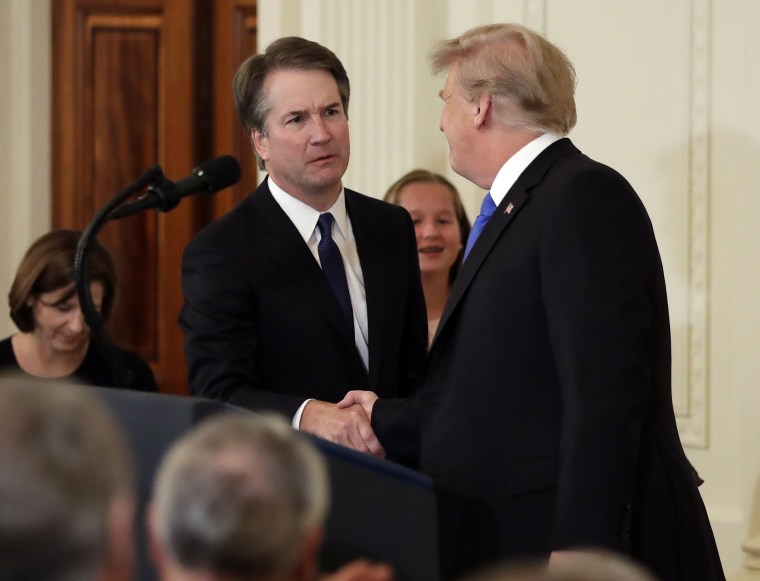Over the course of many years, the right has created an intellectual architecture that exists for a single purpose: to scrutinize jurists for their fealty to the conservative cause. The result is a dynamic in which Donald Trump and his White House team didn't have to come up with a short list of Supreme Court nominees; the president could outsource the heavy lifting to interest groups that were only too pleased to deliver such a list to the Oval Office.
With this in mind, Trump was given the task of simply choosing from a list that was prepared for him, and to no one's surprise, he chose Brett Kavanaugh, a federal appeals court judge in Washington.
Sen. Dick Durbin (D-Ill.) once famously described Kavanaugh as the "Forrest Gump of Republican politics," because he's popped up in so many of the major events of the last generation. Bush v. Gore? Kavanaugh was there. The investigation into Vince Foster's suicide? Kavanaugh was there. Ken Starr's investigation into the Clinton-Lewinski affair? Kavanaugh was there. The Elian Gonzales controversy? Kavanaugh was there.
It's this background that likely would've made the conservative judge a favorite of any Republican president filing a vacancy on the high court. What's unique to this president, however, are the unique circumstances he finds himself in: Donald Trump is the subject of an ongoing criminal investigation, as well as multiple civil suits.
And that's one of the key elements that makes his nomination of Brett Kavanaugh so important. The Washington Post explained a couple of weeks ago:
U.S. Circuit Judge Brett M. Kavanaugh, a former clerk for Supreme Court Justice Anthony M. Kennedy who was nominated replace him, has argued that presidents should not be distracted by civil lawsuits, criminal investigations or even questions from a prosecutor or defense attorney while in office. [...]Having observed the weighty issues that can consume a president, Kavanaugh wrote, the nation's chief executive should be exempt from "time-consuming and distracting" lawsuits and investigations, which "would ill serve the public interest, especially in times of financial or national security crisis."
As the dust settles on last night's news, this is the angle that warrants considerable attention: the sitting president facing potential legal liability specifically chose a judge who believes sitting presidents should never have to face legal liabilities.
Or as Sen. Cory Booker (D-N.J.) said on the show last night, Trump was presented with plenty of choices, but he picked someone for the Supreme Court whom he knew would "have his back."
Let's not lose sight of landscape: the president's former national security advisor will be in court today for the start of his criminal sentencing process. The man who oversaw the president's political operation is facing multiple felony counts and is already sitting in a jail cell. The president's longtime personal attorney is facing possible felony charges and he's just hired a defense attorney with experience from the Clinton impeachment saga.
Trump himself may find himself in Special Counsel Robert Mueller's legal crosshairs, at which point it may fall to the Supreme Court to answer weighty questions of historic significance. Can the president be subpoenaed to testify? Can the president be criminally indicted? Can the president pardon himself? Can the president pardon others if the purpose of those pardons is to undermine the case against himself? Can states bring charges against those who've received federal pardons from the president? Can the president simply dispense with an ongoing probe in which he's the subject?
These are, by and large, unsettled questions, which may soon need answers thanks to the scope of Trump's ongoing scandals.
And there's Brett Kavanaugh, who's already said in writing that a president should not have to deal with such burdens. We're left with a dynamic in which Trump was handed a Supreme Court short list to choose from, and he may very well have prioritized self-preservation, picking the judge who's most likely to protect this president's fate.
